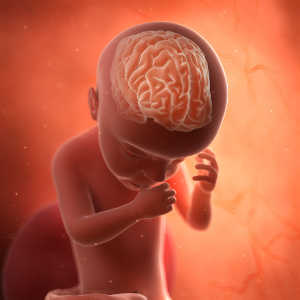Vitamin D deficiency affects the neuronal development and the risk of schizophrenia
 During pregnancy, vitamin D plays an important role in the bone development of the unborn child, in the brain, and in other functions. Maternal lack of vitamin D during pregnancy may therefore have serious consequences for the fetus and its development. This also goes for the development of neurons in the dopamine-producing area of the brain, which can most likely result in dysfunctions of the dopamine balance, a problem that is seen in young individuals and adults with schizophrenia. This was demonstrated in a new study that is published in Journal of Neurochemistry. The study supports an earlier review article where it was seen that early stages of psychotic disorders like schizophrenia are linked to severe deficiencies of vitamin D and other nutrients with vital importance to brain health, especially during pregnancy.
During pregnancy, vitamin D plays an important role in the bone development of the unborn child, in the brain, and in other functions. Maternal lack of vitamin D during pregnancy may therefore have serious consequences for the fetus and its development. This also goes for the development of neurons in the dopamine-producing area of the brain, which can most likely result in dysfunctions of the dopamine balance, a problem that is seen in young individuals and adults with schizophrenia. This was demonstrated in a new study that is published in Journal of Neurochemistry. The study supports an earlier review article where it was seen that early stages of psychotic disorders like schizophrenia are linked to severe deficiencies of vitamin D and other nutrients with vital importance to brain health, especially during pregnancy.
Schizophrenia, a disorder that typically occurs when people are 15-30 years of age, is associated with hallucinations, delusions, and other serious symptoms. As a result of the impaired quality of life, patients often live shorter than the general population. We don’t know that much about the neurological causes of this disease but it is thought to be linked to imbalances in the brain’s dopamine levels.
Dopamine is a neurotransmitter that fuels our actions and is often referred to as the “reward molecule” of the brain. It is also known that maternal lack of vitamin D during pregnancy increases the child’s risk of developing schizophrenia later in life.
Professor Eyles from the University of Queensland in Australia is behind a comprehensive study of the mechanisms related to the abnormal release of dopamine and the way a pregnant woman’s lack of vitamin D can affect fetal development and cause imbalances in the dopamine-producing neurons later in life.
The team of scientists developed cells similar to the dopamine-producing neurons during the fetal stage. These neurons were cultivated with or without vitamin D in the form of active 1,25(OH)D that is viewed as a steroid hormone. The scientists used a new technique that allowed to them to analyze functional changes in the neuronal dopamine release, and they found that vitamin D increases both neuronal dopamine synthesis and release. In the future, Professor Eyles and his research team plan to look closer at how maternal vitamin D deficiency during pregnancy will affect the child’s future ability to produce dopamine.
Also, they plan to investigate if there are other risk factors during pregnancy that can disrupt the child’s ability to synthesize and utilize dopamine such as lack of oxygen or infections that can also change the neuronal dopamine release.
Based on their new study, the scientists assume that lack of vitamin D and early disruptions of the neuronal dopamine release during the fetal development can increase the baby’s risk of developing schizophrenia later in life.
Lack of vitamin D and folic acid later in life also increases the risk of schizophrenia
We need vitamin D throughout life to help us regulate a number of genes. The nutrient also has a vital importance for our brain health in general. According to a previous review article that is published in Schizophrenia Bulletin, scientists have found a link between lack of vitamin D and folic acid and early stages of schizophrenia and other psychotic disorders. The researchers also found a link between lack of these nutrients and a deterioration of the mental and physical condition of patients. The researchers therefore want to focus on new ways to prevent and treat schizophrenia and other psychotic disorders, which millions of people across the globe are affected by.
- It appears that there is a link between the widespread vitamin D deficiency problem in the world and the increasing rate of psychotic disorders such as schizophrenia.
- Because so many people avoid the sun and because the recommendations for vitamin D intake are rather conservative, it is a good idea to strive for optimal levels of vitamin D in the blood.
- It is especially important for pregnant women and adolescents to get enough vitamin D to prevent schizophrenia.
References:
Renata Aparecida et al. Vitamin D: A potent regulator of dopaminergic neuron differentiation and function. Journal of Neurochemistry, 2023
University of Queensland. Vitamin D alters developing neurons in the brain´s dopamine circuit. ScienceDaily May 24, 2023
Nutritional Deficiencies and Clinical Correlates in First-Episode Psychosis: A Systematic Review and Meta-analysis. Schizophrenia Bulletin. 2017
Search for more information...
- Created on .








